Why don’t homeless people just get jobs?
I was nearly homeless once because of illness and no medical insurance, which ate up all my savings. For over a year in 1991 it led me to activism involving homelessness. Most people with some compassion think, feel, and have their own opinions. But the facts matter more if we are to get our city …
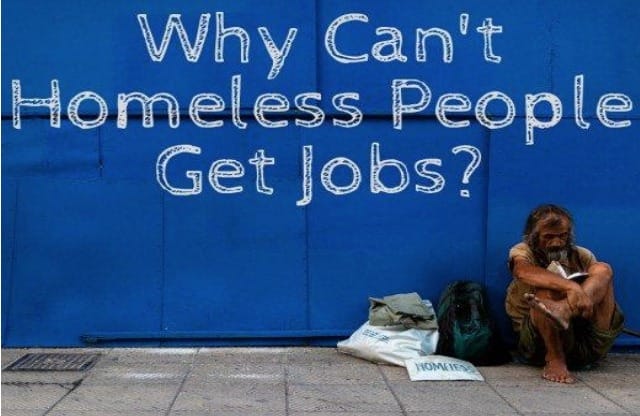
I was nearly homeless once because of illness and no medical insurance, which ate up all my savings. For over a year in 1991 it led me to activism involving homelessness. Most people with some compassion think, feel, and have their own opinions. But the facts matter more if we are to get our city out of this mess.
Just comparing the Queen City of Manchester’s population of 120,000 at most, with cities like Seattle, WA. (750,000); San Diego and San Francisco, over 1 million each; and Los Angeles, (4 million) is not a true comparison at all. If we don’t deal with the facts on the major issues, then we can’t begin to identify the causes at the core of our Queen City of Manchester problems ahead.
Below is my report on homelessness and its root causes.
Why Can’t Homeless People Get Jobs (and why ending homelessness isn’t as simple as just getting a job)

There are many assumptions about homeless people. Perhaps the most common is that they are too lazy to work. Having almost been there myself, because of medical issues and having worked with many others in the same situation for years, I have to say that for the vast majority of homeless people, the assumption that they are lazy is dead wrong and your elected officials know it. I used to work one full- and two part-time jobs – a total of three jobs until I got sick. It happened again a second time when the government made a big mistake and declared me dead because my Social Security number registered as someone else, off by one number.
Many people with homes or who are renting look at the horrible lives of people living on the streets and ask why on earth a person wouldn’t do something to help themselves in that situation. They ask, “Why don’t they just get jobs?” Oddly enough, they don’t seem to also ask if jobs are available for them and if there are any barriers to getting a job without having a home or an address. “Why can’t homeless people get jobs?” is a much better question.
I wrote this article to answer that question, to dispel a few more myths, and to drive home the reality that homelessness is something that no one asks for, or deserves.
Why Can’t Homeless People Get Jobs? I’ll tell you why. Here are the Homeless Employment Statistics…
- Homeless People Don’t Have Regular Addresses: Most employers require addresses. This is a lose-lose situation: They can’t get a place to live until they get a job, but can’t get a job until they get a place to live. Go figure.
This is pretty much the definition of being homeless. The lack of an address can be a huge obstacle to finding work. Many do not have even a mailing address they can use on job applications or have the address to a post-office box, church, or mission to use.
Employers are put off by irregular addresses on job applications. Don’t kid yourself; many employers would never consider a homeless person for a job opening. Many have the same misconceptions about them that everyone else does.
To get past this problem, some people lie on applications or find a homed friend to provide an address for them, but this presents its own problems. If they catch this lie, most employers are less-than-understanding and one might lose their job.
- Some Employers Will Not Consider Unemployed Job Applicants. Many employers won’t consider unemployed job applicants (not even those with homes).
If your company downsizes and you become unemployed, you may be unable to find a job that accepts applications from people not currently working. Many job listings state that the unemployed should not apply and especially if you are homeless on top of that. So even if you have a place to live and an address, if you are unemployed, you may have a harder time getting hired.
- Many Don’t Have Reliable Phones. Many homeless people don’t have reliable phones, and this becomes an obstacle to employment. Even if they have a phone, they might not always have a way to charge it.
It’s hard to even have a charged mobile phone without somewhere to plug it in. Most employers won’t even bother to figure out how to contact an applicant without a phone. This makes having a $25 pay-as-you-go phone a lifesaver for many. I’ve seen a number of people on the Internet complaining about homeless people with cell phones. Perhaps if they knew that a cell phone is often their only way to get a job, they might stop the complaining. Then again, maybe not. I hear many elected officials who say: “Get A Job!” or “How come you have a phone?”
- It’s Hard to Stay Clean and Neat When You’re Homeless.It’s hard to stay clean and neat when you’re homeless, and most employers require grooming.
The cleanliness required of job applicants or employees can be unattainable for some. I’ve seen the suggestion that people just don’t try hard enough to stay clean and well-groomed, but do you honestly think that you could show up to a job interview with a tidy haircut, a pressed suit and tie, shined shoes, a shower-fresh smell, and a clean shave without a home? For women, the situation is even harder due to social requirements to wear make-up.
- Many Homeless People Have Gaps in Their Employment History. Many have gaps in their employment history, which is something that employers are suspicious about.
Employment gaps are not surprising considering that such gaps in employment are often the cause of their homelessness. But still, most applications require an explanation for all gaps in employment, so the homeless person can either risk a lie or tell the truth and doom themselves. Even if the period of unemployment was caused by corporate downsizing, very few employers care to hear explanations.
- Homeless People Have Poor Credit Scores. They have lousy credit scores. Many employers do credit screenings on potential employees, and when you’re homeless, your credit score will suffer.
Maintaining a great debt-to-income ratio is not easy when you live in a tent or some other unconventional place. In many states, it’s perfectly legal for employers to run a credit screening on job applicants and disqualify those with poor credit ratings. As you can imagine, not having income leads to evictions and medical bankruptcies and past-due bills on your record, thus this destroying your credit score. I doubt there are many, if any, homeless people with sterling credit ratings.
- Many Homeless People Don’t Have Cars. Many jobs require transportation. That can be a huge obstacle to getting to work.
For some, it’s a home-on-wheels, but many don’t have even that. Many jobs require that applicants have dependable transportation. Sometimes this can be the bus, but if work hours are irregular and begin before buses start running or after they have stopped, it means owning your own vehicle. So not having a car or the money to pay a bus fare means you can’t get to work. To work my job at Home Depot in Hooksett, I require transportation. It costs me $120 monthly, but I’m not allowed to claim the expense because I don’t own the car, even though they know I must pay someone to get me to and from work daily. It’s crazy.
- Many Homeless People Have Criminal Records. The criminal records are often a result of their homelessness (and sometimes, their only crime was not having a place to sleep). So our city officials pulled them from their tents without finding them any other shelter. and did not clean up the mess in many places. So where were they supposed to go? Of course, they went downtown, as our elected officials took away the only home they knew.
The Board of Mayor and Aldermen has not adequately addressed this crisis. Homelessness in itself is often a crime in the Queen City of Manchester. It shouldn’t be.
In many cities in America, the state of being homeless is inherently illegal, so getting a criminal record is inevitable if one has nowhere to live in those areas. While some people on the street do commit crimes, sometimes their only crime is being without a place to sleep or to find a place to go to an indoor bathroom; where the city parks public bathrooms, paid for by the taxpayers, are no longer available to all citizens of Manchester.
In 2018 the BMA created a segregated bathroom with two portables covered by a shed, where the park’s public bathrooms are closed to certain populations of the Queen City. in 2018 it was reported by the MPD Chief and City Solicitor that 76 people were arrested between Bridge and Granite streets off of Elm Street. Yet, only 13 of those arrested were homeless – the remaining 63 arrests were people doing business on Elm Street who created those crimes and not the homeless population. It often doesn’t take long for them to get criminal records without doing anything wrong. Charges for loitering, trespassing, unauthorized camping, or for falling asleep in a place not designated as a residence are common.
(Let’s not forget the fact that the BMA closed the Veteran’s Park public bathrooms six years ago and still we as a city have not resolved that issue other than for them to create a segregated indoor heated and outdoor portables covered by a shed. Within 50 feet of each other are two working sets of bathrooms. One for the haves and the other for the have nots – without heat in the winter months. As unforgiving as that is, we treat our pets better. It’s a double standard.
When we as a city start treating humans worse then we treat our pets, then how can you expect respect or work toward solving our city problems? (One can be arrested for mistreating our pets, but not how we treat homelessness.) The BMA has turned a $56,000 repair estimate into a nearly $200,000 budget to repair it two years later. They created this crisis, now’s time to fix it.
Yet the BMA six’s years ago closed the bathrooms at Veterans Park and today there are more drug-related crimes in that downtown park than ever before and it had nothing to do the public bathrooms.

And since employers are turned off by criminal records, applicants without criminal records will almost always be preferred. Even if a homeless person lucks out and avoids getting a criminal record, he or she will often be assumed to be a criminal and an addict if their un-housed status is discovered. It’s a black-eye for the city. It’s time to solve it. By definition, disability is the inability to perform substantial work. This is why many disabled people are homeless.
- Many Homeless People Are Disabled. Of the disabled, many people with mental or physical disabilities end up on the street.
Whether physically or mentally ill, many homeless people are disabled by their illnesses. I’ve read the criticisms and assertions that those with mental illness just need to straighten up and get a job. The problem is that anyone mentally ill enough to be sleeping in a cardboard box isn’t fit to work a job until he or she gets at least a little better. They aren’t faking; they aren’t just being too lazy to work. Mentally ill homeless people are just that— mentally ill, and we need to care for them if they are to get better.
Do homeless people choose to be homeless?
How could anyone possibly think that sleeping outside, getting beaten and abused, and suffering humiliation after humiliation is preferable to working and having a safe, comfortable place to sleep and going to the bathroom, protection from assault, and respect from your fellow man? If a person really thought that the horror of homelessness was better than working a job, wouldn’t that be pretty insane in itself? It’s not a choice.
Here in the City of Manchester we have not built any affordable housing in the last two years and the city’s 10-year plan wants to element affordable workforce housing altogether. Can you imagine all the seniors on Social Security losing their rents due to unaffordable housing – doubling if not tripling – if that happens anytime soon? How many seniors -– low-income earners, mentally ill, disabled and children – would become homeless? Unacceptable. You think we have lots of homeless now. That would be a crisis that only our elected officials could create without using common-sense policies.
Those strange smelly homeless guys or gals yelling nonsense at passersby or banging their heads against a building are disabled by their mental illnesses. Some are physically too ill to hold down a job as well.
If people are disabled, then why aren’t they living in a cheap apartment supported by Social Security Disability?
- They are often still in the process of applying for it. The first denial can take up to six months and the first appeal takes around 500 days. During that time, the physically disabled with nowhere to live are both unable to work and not getting any income.
- Also, to get Disability, applicants must be available to be contacted and able to make it to appointments, sometimes hundreds of miles away.
- Sometimes, getting Disability is impossible for homeless people. Being without an address might cause them to experience a delay to get in mail delivery, making them disqualified to receive assistance for missing an appointment. Food assistance is often pretty much all they can get and still without a place for them to cook they lose their food stamps too.
- Many of the mentally disabled who are living on the street are too messed up to get or hold down a job or sometimes even understand what is going on around them. If they are too disconnected or disaffected from reality to work a job, how on earth are they going to navigate the process of filing for Disability? That’s why!
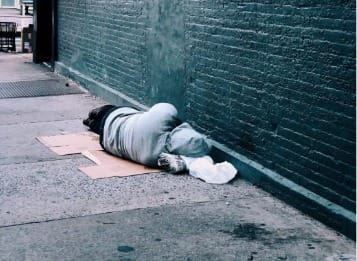
- Addiction (and the Assumption of Addiction is an Obstacle to Employment Addiction might play a part. Addictions prevent them from looking for work and from getting hired. Many employers assume homeless people are all addicts. They are Not!
Not all homeless people are addicted to drugs, but most people believe that they are, including employers. (When was the last time the MPD had a Drug Bust and they were all homeless. It just doesn’t happen because they are homeless… Roughly 6% are Addicted.
Most people think this is the major reason homeless people don’t get jobs, and it may be true for many chronically homeless people, but not all. Lots of people get addicted to drugs and not only because they become homeless. Addictions prevent them from looking for work and from getting hired. However, the perception that all homeless people are drug-addicted criminals is possibly a greater barrier to their employment than actual drug addiction is. There’s no doubt that addiction causes many people to remain homeless, but it is by no means the only reason all homeless people without homes or why they are not working.
These days, people with advanced degrees are applying for low-wage positions and general labor jobs. Why is that?
- Many Homeless People Have Jobs Already. Despite having a job, people can still lose their homes or be unable to afford housing.
One reason someone without housing may not be looking for a job is that he or she may have a job or two already. Approximately a third to one-half of the homeless population is employed.
Despite having a job, people can still lose their homes or be unable to afford housing.
During the current economic situation, and with so many people un-housed due to mortgage foreclosures, in some cities well over half of the homeless population has jobs. Nationwide, the employment rate is about 44 percent for people without homes. Keeping in mind how many are elderly, children, disabled, or mentally ill that’s a pretty high percentage.
Why don’t these people have housing if they are employed?
- Many are working at minimum wage jobs which don’t provide enough to pay for basic living expenses in many parts of the country.
- Many of them are underemployed or work part-time jobs that they don’t get enough hours of work to pay the bills.
- Some people who work for low wages and lose their homes when a company cuts back their hours.
There are working people all around you who are living in cars, in shelters, or on the street. In some cities like New York (and Manchester is no different) where even having work at a full-time job, is no guarantee of affordable housing.
So why don’t they just get more work and work two or three jobs at a time?
Many of them do. But a cluster of minimum-wage jobs at a few hours a week doesn’t generally get them very far. Getting enough hours with multiple jobs can be very difficult as well. To make multiple jobs work, employers have to be willing to work with a schedule that accommodates their employee’s other jobs. Finding two (much less more) employers willing to work around other work schedules is difficult enough, but each added job makes finding and keeping a balance even more difficult. It is an extremely rare employer who is willing to schedule an employee around that employee’s other job schedule.
I’ve worked as many as five part-time jobs at a time, which averaged me around a 65- to 70-hour workweek just to make ends meet. I had a home and a phone and it was still difficult to juggle the schedule. Eventually, I was forced to cut back to three jobs because of employers unwilling to work around other work schedules. But that made me less of an income and housing became unaffordable again. So one is homeless again, living in a car or shelter.
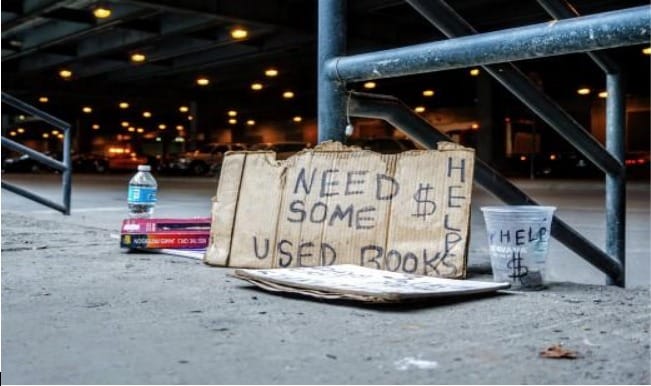
Find out why ending homelessness isn’t as simple as just getting a job.
Each of these situations is described fully below, where you’ll also find information about job statistics, how to help a homeless person get a job, and discussions about how easy it is to lose your home, whether or not homeless people are just lazy, and why money alone can’t solve the problem.
Homeless Employment Statistics
The fact is that many working a full-time job aren’t making enough to pay for housing, but this is largely an invisible problem due to a lack of data. This reality is not invisible to anyone who looks around their community and sees an increasing number of people living on the street or in their cars, but it is invisible to those who only believe the numbers. However, there are some numbers to look at
- Researchers at the Urban Institute estimate that approximately 25 percent of the homeless population is employed.
- The National Coalition for the Homeless estimates that between 40 and 60 percent of homeless people shift in and out of full-time and part-time work.
- The Washington Council of Governments’ 2017 report says that 22 percent of homeless, single adults and 25 percent of adults in homeless families are employed.
- The federal and state minimum wage is currently $7.25 per hour, but nationwide to afford paying your rent an average hourly wage of $16.38 is required to rent an apartment.
- The population of working homeless is growing in cities across the U.S. This is not only a Manchester problem; it’s a statewide and national problem as well.
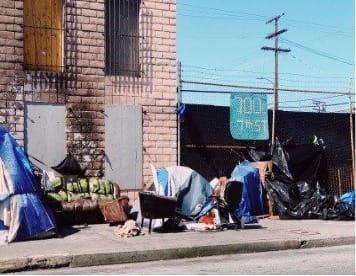
Homeless people can’t get a place to live until they get a job… but can’t get a job until they get a place to live. Go Figure.
Money Alone Isn’t Enough to Rent an Apartment – What?!?
That’s right, money alone is not enough to rent most apartments. To get into most apartment complexes in the United States, applicants must have a good credit score, good references, and have a job at which they earn at least three times as much as the monthly rent. (Manchester is no different.)
How much money do you need to make to rent an apartment?
While a person might be able to afford to rent an apartment working a minimum wage job by sticking to a very strict budget, still, most apartment complexes will not rent to them knowing that there are other bills needed to pay to survive. Like food, medical, electricity, vehicle cable, phone, heat and other necessary living expenses. A very modest one-bedroom apartment might have cost only $600 a month in 2000’s budget housing, but in today’s housing cost with an average increase of 5 percent per year, the average one-bedroom apartment goes for $1,200. Those who rent it must now earn at least $1,950 a month in most cases. If you rent a two- or three-bedroom you can add another $200 to $300 more in rent. That takes the income needed to rent a two- or three-bedroom apartment to $2,150 to $2,250 a month.
Manchester reality
Here in Manchester, a person needs to earn at least a higher minimum wage of $12.20 per hour to rent a one-bedroom or $13.45 for a two-bedroom, and $14.10 for a three-bedroom to even be considered as an acceptable applicant for the apartment.
I recently tried to help a family of five to fill out paperwork to move into a low-income apartment complex and the requirement on their paperwork read that the rent must not exceed 30 percent of the applicant’s combined income. So their $700 a month of income does not pay for the apartment which requires them to earn at least $2,350 per month to be allowed to rent it (and that was an affordable low-income housing program.) So they slept in their vehicle since June, so they can at least afford food for the five of them (the two parents and three children.) There are at least 30 other families this past winter that were living in their vehicles with similar situations.
Co-signers could help. Unfortunately, the combined income of the renter and the co-signer usually have to equal at least five times the monthly rent and the co-signer must not have a high debt-to-income ratio.
Are Homeless People Just Lazy?
You hear people claim that homeless people are just lazy, but can you imagine someone saying to themselves, “I don’t want to work. It’s just no fun. I think I’d rather live on the street, exposed to the elements and violence.” That makes no sense. There are many reasons for homelessness, but “laziness” is not on the list for most of our homeless population (since lots of them are already working.)
What are the main causes of Homelessness?
- Low incomes and poverty. In Manchester 35 – 67 percent of students receive free and reduced school lunches, because of their poverty levels.
- Lack of affordable housing. Many lose their apartments even if they are working because rent is not affordable to many of those in poverty.
- Unemployment. Many can’t work full-time because of illness while others can’t do high-tech jobs. (Here in Manchester we lost thousands of manufacturing jobs.)
- Family and relationship breakdowns.
- Domestic violence.
- Evictions and foreclosures.
- The effects of racial disparities.
- Disabilities and poor physical health.
How to Help a Homeless Person Get a Job
Even if you can’t invite them to live with you, there are many things you can do to help.
- Hire them! If you have a job that fits their skills, give them a chance.
- If you know of any job opportunities, let them know. Ask around and do some legwork to help them connect with potential employers.
- Help them get a used phone
- Help them set up and get to a job interview
- Drive them to work (or help them pay for transportation until they get their first check).
- Let them use your address on their applications.
- Co-sign to help them get an apartment (so they’ll have an address to use on their application or let them use your address.)
- Let them shower at your house.
- Let them wash and dry their clothes in your laundry machines.
- Give them some clean, work-appropriate clothing.
- Help them improve their credit scores.
- Help them get and take their medications.
- Help them access your local support organizations.
- Make sure they’re eating properly.
- Be a friend. Listen to them and share your experience. Moral support helps, too!
How Easy Is It to Become Homeless?
If you ask how many people in the U.S. are homeless now or how many people lose their homes each month, you won’t be able to find firm figures. That’s because most studies get their numbers by sporadically counting people who are in shelters or on specific streets at specific times, so those surveys underestimate the total number of people who are couch-surfing or living on the street of Manchester today. But it is estimated there are 4 million homeless in the USA.
In our Manchester public education system, we’ve gone from 601 homeless students two years ago to 1,044 students in need of some kind of housing within a school year’s time, of those 248 Students are in need of emergency housing daily. That’s double in two years alone, so we are not making progress. We’ve gone from 56 percent of students in poverty to 67 percent in two years. Today 67 percent of students who qualify for free or reduced school lunches because of the 35 percent poverty in the Queen City of Manchester.
Manchester in 2015 saw 23 percent in 2017 it was 29 percent, today in 2019 it’s 35 percent poverty in our Queen City, an increase of 6 percent every two years. We need to fix this by bringing the numbers down — not up — 3 percent a year if we are to start solving our problems. Let’s move Manchester forward again as it once was. It’s time.
But no matter how imprecise the data is, one thing we do know is that homelessness is increasing at an alarming rate. Every day, it’s getting easier and easier to lose everything and find yourself on the street. But if you fall into any of the following categories, your chance of becoming homeless increases:
- If your wages don’t keep up with inflation and cost of living increases. In the 1960s, a minimum-wage job could support a family of three, but that’s no longer true today.
- If you get laid off, downsized, or fired. Loss of employment is one of the most common ways to lose housing.
- If you live in NH. Our wages in Manchester and throughout NH are still at the federal minimum wage of $7.25 per hr. We’re the only New England state left at that level.
- If you lose your home. In the last 10 years, home foreclosures have increased by over 30 percent, which also leads to an increase in evictions for renters. Yet our wages are not meeting up with the cost of living that is mostly to blame for the rise in homelessness within the Queen City.
- If you get too old. 50 percent of the homeless population are over the age of 50, many in their 60s, 70s and even 80s. Yet our present Mayor keeps reciting that the city’s homeless senior population can return to work. Mayor Craig says: “You can never say never.” Many of our homeless people are over the age of 68 and growing in that category. Most of them are too sick or too frail to return to work. They have health issues from heart disease and diabetes to cancer which prevents them from returning to work. That is the reality and we should be finding them a place to stay that is stable. This is the easy part of our homeless demographic population problems, as they are not high maintenance troubled citizens.
- If you serve in the military. About 8 percent of the homeless population are veterans. The same goes for our disabled veterans who deserve better from us.
- If you can’t afford healthcare. Medical costs are a common reason for bankruptcy and poverty, and health problems or disabilities lead to homelessness. In this country, we have just gone backward in affordable health care and we see it here as well, especially within the mental health issues of our homeless population. This is not the way Manchester needs to be. We can do something about it and I will do a lot to quell the homeless population by addressing the root causes of this epidemic as your next mayor. We have no choice. Something has to be done. We need action now, sooner than later. It’s time for real changes if we are to resolve our city issues.
- If you are hit by a natural disaster. Wildfires, hurricanes, or other natural disasters are on the rise, and those events usually precipitate housing crises. Thankfully, that is not a very big problem in Manchester.)
- If you are disabled. More than 40 percent of the homeless population are people with disabilities, and this number keeps rising.
- If you have mental health issues or issues with substance abuse. Half of the people in shelters have either a substance use disorder, a psychiatric disorder, or both. Those with mental health issues, students, plus those in with addictions make up our highest rising homeless populations within all our categories. We’ve seen an increase in violent crimes in the Queen City with shootings and stabbings almost weekly this summer. Talk is cheap and action is needed today! We need it now.) Let’s work together. I will work with all agencies and get it done right within the next two years of being your Mayor.
- If you are a victim of domestic violence. More than 80 percent of homeless mothers with children have experienced domestic violence.
- If you don’t conform to gender or sexual norms, you risk being kicked out of your home and losing familial support. In the U.S. more than 110,000 LGBTQ youth are homeless. In Manchester, that homeless number is estimated at nearly 150 LGBTQ.
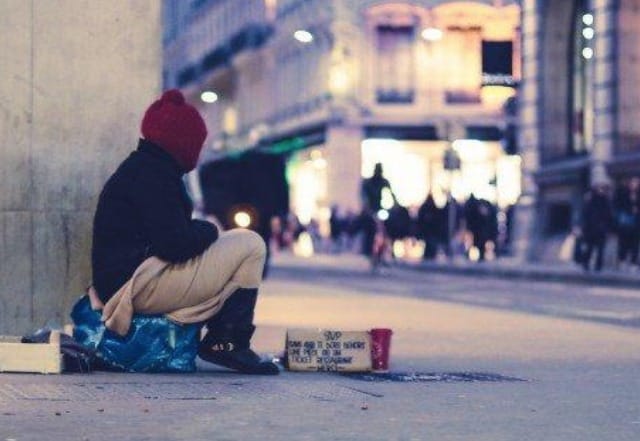
Today, avoiding homelessness is getting harder and harder for the average American.
Do you now have a better idea of why those living on the streets don’t just get jobs?
Did you learn anything about why people don’t just get jobs and stop being homeless?
Yes
No
I knew all this stuff already.
Send your responses to me at ouelletteformayor@gmail.com and see the results on my Facebook Page Results>
Glenn RJ. Ouellette, the People’s Mayor & Your Citizens Conscience Not an Echo!
603-289-6835 ouelletteformayor@gmail.com
Why Don’t Homeless People Just Get Jobs? Updated and written on Sept. 02nd, 2019 By: Glenn RJ. Ouellette “The People’s Mayor & Your Citizen Conscience”. Ouellette is a Candidate for Mayor in the upcoming Sept. 17th. Primary Elections.





